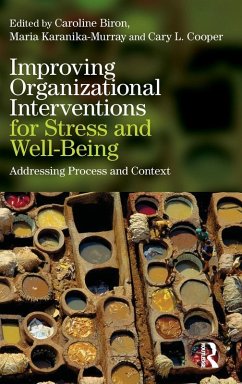Improving Organizational Interventions For Stress and Well-Being
Addressing Process and Context
Herausgeber: Biron, Caroline; Cooper, Cary; Karanika-Murray, Maria
Improving Organizational Interventions For Stress and Well-Being
Addressing Process and Context
Herausgeber: Biron, Caroline; Cooper, Cary; Karanika-Murray, Maria
- Gebundenes Buch
- Merkliste
- Auf die Merkliste
- Bewerten Bewerten
- Teilen
- Produkt teilen
- Produkterinnerung
- Produkterinnerung
This book brings together a number of experts in the field of organizational interventions for stress and well-being, and discusses the importance of process and context issues to the success or failure of such interventions.
Andere Kunden interessierten sich auch für
![Improving School Climate Improving School Climate]() George G. BearImproving School Climate47,99 €
George G. BearImproving School Climate47,99 €![Mental Health and Well-being Interventions in Sport Mental Health and Well-being Interventions in Sport]() Mental Health and Well-being Interventions in Sport195,99 €
Mental Health and Well-being Interventions in Sport195,99 €![Organizational Behavior Management Approaches for Intellectual and Developmental Disabilities Organizational Behavior Management Approaches for Intellectual and Developmental Disabilities]() Organizational Behavior Management Approaches for Intellectual and Developmental Disabilities196,99 €
Organizational Behavior Management Approaches for Intellectual and Developmental Disabilities196,99 €![Organizational Justice Organizational Justice]() Organizational Justice228,99 €
Organizational Justice228,99 €![Improving Survey Methods Improving Survey Methods]() Improving Survey Methods228,99 €
Improving Survey Methods228,99 €![Using Client Feedback in Executive Coaching: Improving Reflective Practice Using Client Feedback in Executive Coaching: Improving Reflective Practice]() Hélène SeilerUsing Client Feedback in Executive Coaching: Improving Reflective Practice41,99 €
Hélène SeilerUsing Client Feedback in Executive Coaching: Improving Reflective Practice41,99 €![Improving Care in the Community. Improving Care in the Community.]() Tim PriceImproving Care in the Community.22,99 €
Tim PriceImproving Care in the Community.22,99 €-
-
-
This book brings together a number of experts in the field of organizational interventions for stress and well-being, and discusses the importance of process and context issues to the success or failure of such interventions.
Hinweis: Dieser Artikel kann nur an eine deutsche Lieferadresse ausgeliefert werden.
Hinweis: Dieser Artikel kann nur an eine deutsche Lieferadresse ausgeliefert werden.
Produktdetails
- Produktdetails
- Verlag: Routledge
- Seitenzahl: 400
- Erscheinungstermin: 21. Mai 2012
- Englisch
- Abmessung: 240mm x 161mm x 26mm
- Gewicht: 763g
- ISBN-13: 9781848720565
- ISBN-10: 1848720564
- Artikelnr.: 37196007
- Herstellerkennzeichnung
- Libri GmbH
- Europaallee 1
- 36244 Bad Hersfeld
- gpsr@libri.de
- Verlag: Routledge
- Seitenzahl: 400
- Erscheinungstermin: 21. Mai 2012
- Englisch
- Abmessung: 240mm x 161mm x 26mm
- Gewicht: 763g
- ISBN-13: 9781848720565
- ISBN-10: 1848720564
- Artikelnr.: 37196007
- Herstellerkennzeichnung
- Libri GmbH
- Europaallee 1
- 36244 Bad Hersfeld
- gpsr@libri.de
Caroline Biron is a Chartered Psychologist and Associate Professor in Occupational Health and Safety Management in the Faculty of Administrative Sciences, and a member of the Chair in Occupational Health and Safety Management at Laval University, Québec, Canada. Her work on the intervention process won the Best Intervention Competition award at the Work, Stress & Health Conference 2011. Maria Karanika-Murray is an Occupational Health Psychologist and Senior Lecturer in Psychology at Nottingham Trent University, UK. Her research focuses on the importance of the organizational context for employee health and well-being, and the assessment and management of work-related health and well-being. Cary L. Cooper CBE is Distinguished Professor of Organizational Psychology and Health at Lancaster University Management School, UK; Chair of the Academy of Social Sciences and Editor of the journal Stress and Health. He was honoured by the Queen with Commander of the British Empire for his contribution to occupational health.
N. K.Semmer
Foreword C. Biron
M. Karinika-Murray
C. L. Cooper
Organizational Interventions for Stress and Well-Being Part 1. Challenges and Methodological Issues in Organizational-Level Interventions A.D. La Montagne
A.J. Noblet
P.A. Landsbergis
Intervention Development and Implementation: Understanding and Addressing Barriers to Organisational-Level Interventions N. Mellor
M. Karanika-Murray
E. Waite
Taking a Multi-Faceted
Multi-Level
and Integrated Perspective for Addressing Psychosocial Issues at the Workplace L. E. Tetrick
J. C. Quick
P. L. Gilmore
Research in Organizational Interventions to Improve Well-Being: Perspectives on Organizational Change and Development M. F. Dollard
Psychosocial Safety Climate: A Lead Indicator of Workplace Psychological Health and Engagement and a Precursor to Intervention Success S. D. Tvedt
P. O. Saksvik
Perspectives on the Intervention Process as a Special Case of Organizational Change R. Randall
K. M. Nielsen
Does the Intervention Fit? An Explanatory Model of Intervention Success and Failure in Complex Organizational Environments G. Baril-Gingras
M. Bellemare
C. Brisson
How can Qualitative Studies Help Explain the Role of Context and Process of Interventions on Occupational Safety and Health and on Mental Health at Work? C. Biron
What Works for Whom in Which Context?: Researching Organizational Interventions on Stress and Well-Being Using Realistic Evaluation Principles Part 2. Addressing Process and Context in Practice R. Bourbonnais
N. Jauvin
J. Dussault
M. Vézina
Evaluation of an Intervention to Prevent Mental Health Problems Among Correctional Officers R. Lewis
J. Yarker
E. Donaldson-Feilder
The Vital Role of Line Managers in Managing Psychosocial Risks V. Brunsden
R. Hill
K. Maguire
The Impact of Process Issues on Stress Interventions in the Emergency Services
J. Klein Hesselinck
N. Wiezer
H. Den Besten
E. De Kleijn
The Development of Smart and Practical Small Group Interventions for work Stress Part 3. Policy Implications C. Mackay
D. Palferman
H. Saul
S. Webster
C. Packham
Implementation of the Management standars for Work-Related Stress in Great Britain
K. Daniels
M. Karanika-Murray
N. Mellor
M. van Veldhoven
Moving Policy and Practice Forward: Beyond Prescriptions for Job Characteristics A. Weyman
Evidence-Based Practice - Its Contributions to Learning in Managing Workplace Health Risks Part 4. Conclusions M. Karanika-Murray
C. Biron
C.L. Cooper
Concluding Comments: Distilling the Principles of Successful Organizational Intervention Implementation.
Foreword C. Biron
M. Karinika-Murray
C. L. Cooper
Organizational Interventions for Stress and Well-Being Part 1. Challenges and Methodological Issues in Organizational-Level Interventions A.D. La Montagne
A.J. Noblet
P.A. Landsbergis
Intervention Development and Implementation: Understanding and Addressing Barriers to Organisational-Level Interventions N. Mellor
M. Karanika-Murray
E. Waite
Taking a Multi-Faceted
Multi-Level
and Integrated Perspective for Addressing Psychosocial Issues at the Workplace L. E. Tetrick
J. C. Quick
P. L. Gilmore
Research in Organizational Interventions to Improve Well-Being: Perspectives on Organizational Change and Development M. F. Dollard
Psychosocial Safety Climate: A Lead Indicator of Workplace Psychological Health and Engagement and a Precursor to Intervention Success S. D. Tvedt
P. O. Saksvik
Perspectives on the Intervention Process as a Special Case of Organizational Change R. Randall
K. M. Nielsen
Does the Intervention Fit? An Explanatory Model of Intervention Success and Failure in Complex Organizational Environments G. Baril-Gingras
M. Bellemare
C. Brisson
How can Qualitative Studies Help Explain the Role of Context and Process of Interventions on Occupational Safety and Health and on Mental Health at Work? C. Biron
What Works for Whom in Which Context?: Researching Organizational Interventions on Stress and Well-Being Using Realistic Evaluation Principles Part 2. Addressing Process and Context in Practice R. Bourbonnais
N. Jauvin
J. Dussault
M. Vézina
Evaluation of an Intervention to Prevent Mental Health Problems Among Correctional Officers R. Lewis
J. Yarker
E. Donaldson-Feilder
The Vital Role of Line Managers in Managing Psychosocial Risks V. Brunsden
R. Hill
K. Maguire
The Impact of Process Issues on Stress Interventions in the Emergency Services
J. Klein Hesselinck
N. Wiezer
H. Den Besten
E. De Kleijn
The Development of Smart and Practical Small Group Interventions for work Stress Part 3. Policy Implications C. Mackay
D. Palferman
H. Saul
S. Webster
C. Packham
Implementation of the Management standars for Work-Related Stress in Great Britain
K. Daniels
M. Karanika-Murray
N. Mellor
M. van Veldhoven
Moving Policy and Practice Forward: Beyond Prescriptions for Job Characteristics A. Weyman
Evidence-Based Practice - Its Contributions to Learning in Managing Workplace Health Risks Part 4. Conclusions M. Karanika-Murray
C. Biron
C.L. Cooper
Concluding Comments: Distilling the Principles of Successful Organizational Intervention Implementation.
N. K.Semmer
Foreword C. Biron
M. Karinika-Murray
C. L. Cooper
Organizational Interventions for Stress and Well-Being Part 1. Challenges and Methodological Issues in Organizational-Level Interventions A.D. La Montagne
A.J. Noblet
P.A. Landsbergis
Intervention Development and Implementation: Understanding and Addressing Barriers to Organisational-Level Interventions N. Mellor
M. Karanika-Murray
E. Waite
Taking a Multi-Faceted
Multi-Level
and Integrated Perspective for Addressing Psychosocial Issues at the Workplace L. E. Tetrick
J. C. Quick
P. L. Gilmore
Research in Organizational Interventions to Improve Well-Being: Perspectives on Organizational Change and Development M. F. Dollard
Psychosocial Safety Climate: A Lead Indicator of Workplace Psychological Health and Engagement and a Precursor to Intervention Success S. D. Tvedt
P. O. Saksvik
Perspectives on the Intervention Process as a Special Case of Organizational Change R. Randall
K. M. Nielsen
Does the Intervention Fit? An Explanatory Model of Intervention Success and Failure in Complex Organizational Environments G. Baril-Gingras
M. Bellemare
C. Brisson
How can Qualitative Studies Help Explain the Role of Context and Process of Interventions on Occupational Safety and Health and on Mental Health at Work? C. Biron
What Works for Whom in Which Context?: Researching Organizational Interventions on Stress and Well-Being Using Realistic Evaluation Principles Part 2. Addressing Process and Context in Practice R. Bourbonnais
N. Jauvin
J. Dussault
M. Vézina
Evaluation of an Intervention to Prevent Mental Health Problems Among Correctional Officers R. Lewis
J. Yarker
E. Donaldson-Feilder
The Vital Role of Line Managers in Managing Psychosocial Risks V. Brunsden
R. Hill
K. Maguire
The Impact of Process Issues on Stress Interventions in the Emergency Services
J. Klein Hesselinck
N. Wiezer
H. Den Besten
E. De Kleijn
The Development of Smart and Practical Small Group Interventions for work Stress Part 3. Policy Implications C. Mackay
D. Palferman
H. Saul
S. Webster
C. Packham
Implementation of the Management standars for Work-Related Stress in Great Britain
K. Daniels
M. Karanika-Murray
N. Mellor
M. van Veldhoven
Moving Policy and Practice Forward: Beyond Prescriptions for Job Characteristics A. Weyman
Evidence-Based Practice - Its Contributions to Learning in Managing Workplace Health Risks Part 4. Conclusions M. Karanika-Murray
C. Biron
C.L. Cooper
Concluding Comments: Distilling the Principles of Successful Organizational Intervention Implementation.
Foreword C. Biron
M. Karinika-Murray
C. L. Cooper
Organizational Interventions for Stress and Well-Being Part 1. Challenges and Methodological Issues in Organizational-Level Interventions A.D. La Montagne
A.J. Noblet
P.A. Landsbergis
Intervention Development and Implementation: Understanding and Addressing Barriers to Organisational-Level Interventions N. Mellor
M. Karanika-Murray
E. Waite
Taking a Multi-Faceted
Multi-Level
and Integrated Perspective for Addressing Psychosocial Issues at the Workplace L. E. Tetrick
J. C. Quick
P. L. Gilmore
Research in Organizational Interventions to Improve Well-Being: Perspectives on Organizational Change and Development M. F. Dollard
Psychosocial Safety Climate: A Lead Indicator of Workplace Psychological Health and Engagement and a Precursor to Intervention Success S. D. Tvedt
P. O. Saksvik
Perspectives on the Intervention Process as a Special Case of Organizational Change R. Randall
K. M. Nielsen
Does the Intervention Fit? An Explanatory Model of Intervention Success and Failure in Complex Organizational Environments G. Baril-Gingras
M. Bellemare
C. Brisson
How can Qualitative Studies Help Explain the Role of Context and Process of Interventions on Occupational Safety and Health and on Mental Health at Work? C. Biron
What Works for Whom in Which Context?: Researching Organizational Interventions on Stress and Well-Being Using Realistic Evaluation Principles Part 2. Addressing Process and Context in Practice R. Bourbonnais
N. Jauvin
J. Dussault
M. Vézina
Evaluation of an Intervention to Prevent Mental Health Problems Among Correctional Officers R. Lewis
J. Yarker
E. Donaldson-Feilder
The Vital Role of Line Managers in Managing Psychosocial Risks V. Brunsden
R. Hill
K. Maguire
The Impact of Process Issues on Stress Interventions in the Emergency Services
J. Klein Hesselinck
N. Wiezer
H. Den Besten
E. De Kleijn
The Development of Smart and Practical Small Group Interventions for work Stress Part 3. Policy Implications C. Mackay
D. Palferman
H. Saul
S. Webster
C. Packham
Implementation of the Management standars for Work-Related Stress in Great Britain
K. Daniels
M. Karanika-Murray
N. Mellor
M. van Veldhoven
Moving Policy and Practice Forward: Beyond Prescriptions for Job Characteristics A. Weyman
Evidence-Based Practice - Its Contributions to Learning in Managing Workplace Health Risks Part 4. Conclusions M. Karanika-Murray
C. Biron
C.L. Cooper
Concluding Comments: Distilling the Principles of Successful Organizational Intervention Implementation.








